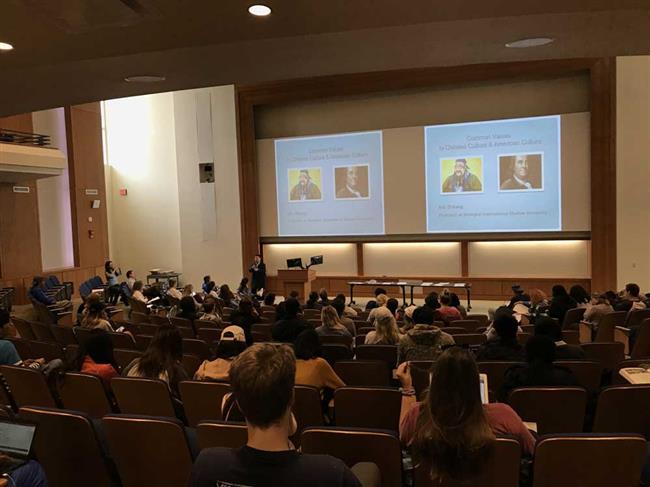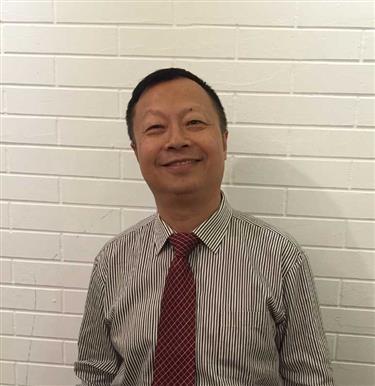Critical study sheds new light on affinities between Confucian and Western ideas

Professor Shi Zhikang discussed similarities between Confucian and Western thoughts at the University of Kentucky on November 6.
EDITOR’S note:
The article is based on the author’s recent speech in the United States.
Confucius is commonly regarded as the greatest sage and Confucius’s Analects is commonly seen as the “Bible” in the Chinese culture. Despite so many translations, Confucius’s Analects has failed to achieve a desirable size of readership in the West. One of the chief reasons for that is that it sounds somewhat distant to the average reader in the West.
Therefore, I deem it as my task to tackle Westerners’ confusion about Confucius effectively by rendering it into a new version, coupled with a new part called “Appreciation & Critical Comments” in which I try to illuminate Confucius’ doctrines and ideas by way of comparing them with similar concepts and notions great minds in the West have enlightened the mankind with.
I have found that, in spite of the difference in terms of modes of expression, the Chinese being more subtle or indirect while the Western more direct and straightforward, the ideas the different languages contain and carry are of a very high degree of affinities rather than alien or contradictory to each other, as the hearts of the humanity beneath the skin are more or less the same.
The talk I gave at the University of Southern California fell into three principal areas, namely learning and practicing, Dao and De, and benevolence and love, in which there are marked affinities between the Chinese culture and the Western culture.
As we all know, Confucius attaches much importance to learning and practicing what one has learnt. He observes, “It is a pleasure if you have learnt something new and put it into practice at regular intervals, isn’t it?” This idea is similar to that of Bacon, who believes that studies can perfect nature, and are perfected by experience, “for natural abilities are like natural plants, that need pruning by study.”
More interestingly, where Confucius draws a distinction among varied attitudes toward the acquisition of knowledge, Bacon divides the pursuit of “truth” into three stages. Confucius observes, “As regards moral cultivation and acquisition of knowledge and furnishing oneself with necessary and essential skills, those who know their importance and contents are inferior to those who are passionate for them; those who are passionate for them are inferior to those who are seeking after them with a ready heart.” Bacon defines the three phases of pursuing “truth” as 1) seeking after truth as if wooing one’s beloved; 2) knowing more about truth by staying with it as much as possible; and 3) enjoying truth to believe in it all the more firmly.
The respective orders of going after knowledge by Confucius and of going after truth by Bacon could be rearranged as thus: what Bacon says might be seen as a continuation of what Confucius says.

Shi Zhikang
Moral ends
Confucius’ notions as regards learning also run parallel with those of other great minds in the West. He remonstrates, “A gentleman never eats to dullness, or demands excessive comfort in shelter. He is assiduous in work, but cautious in words. He is always ready to learn from people on the just and righteous track so as to amend his ways. Such a man is genuinely diligent.”
Henry David Thoreau, a nineteenth-century American essayist, shares a similar view. He says “The aim of the laborer should be, not to get his living, to get ‘a good job.’” The laborer should work not for low ends, “but for scientific, or even moral ends.”
In his “The Autobiography,” Benjamin Franklin , the first personification of American dream, mentions 13 virtues he practices to improve and perfect himself, among which were Temperance, Silence, Resolution, Industry, Sincerity, Justice, Humility, which seem to echo what Confucius tells us in a way.
Confucius’ Dao can be interpreted as the Way, the governing law or guideline, his De de facto the moral integrity or virtues. Confucius says, “You should hold firm and fervent belief in your core values of the philosophical view, … unswervingly adhere to the Way…until the end of your life. …You should participate actively in social activities when the Way prevails; you should withdraw yourself into a quiet home life when the Way fails to prevail. When the Way prevails, you should regard it as a shame if you are worse off and less dignified; when the Way fails to prevail, you should regard it as a shame if you are quite prosperous and pompous.” Here Confucius emphasizes the importance of the core values, for they decide one’s way of life and selection of company, even the career he is inclined to pursue.
In his essay “Philosophy And Politics,” Russell, a celebrated philosopher of the 20th century in the West, expresses a similar view. He says, “In so far as either kind of relation exists, a man’s philosophy has practical importance, and a prevalent philosophy may have an intimate connection with the happiness or misery of large sections of mankind.”
As regards De, Confucius says, “He who rules the state by personal morality and public morality is just like the pole-star, which occupies the central position surrounded by a dense cluster of the reverent stars of lesser note.” He aptly likens the moral integrity to some kind of stronghold, “The Way is what I’m determined to follow, the moral integrity is the stronghold with which I defend against fierce assaults of external forces.”
Shakespeare tells us that human beings may experience “a lust of the blood and a permission of the will,” (Othello), for human beings are living creatures between angels and brutes, after all. Therefore, one’s conscience of moral integrity may reinforce his virtues against external temptations of one type or another.
Benevolence or great love is mostly regarded as one of the most essential concepts of Confucianism, thus it allows for many different labels such as kind-heartedness, altruism, being selfless, a gracious heart, charitable hearts, etc.
Mark Twain says, kindness is a language the deaf can hear and the blind can see. But how to make a person benevolent? Confucius says, “It is advisable to settle down in the neighborhood where kindness and benevolence prevail. It is certainly less wise if one chooses not to live in the neighborhood where kindness and benevolence prevail.”
Nurture is important as or even more important than nature. Nurture largely depends on the company one keeps and the surroundings he stays in.
In light of Marxist doctrines, social realities determine social ideologies. One is subject to his physical surroundings and his ideas and actions are largely a response to what he sees, hears and feels. So if he wishes to be a kind and benevolent man, he should choose to live in kind and benevolent surroundings, and it is particularly so for young people.
This idea is well illustrated by the principal idea in the poem “There Was a Child Went Forth” by Walt Whitman, who is noted for his great democratic thoughts. He says, “There was a child went forth every day, /And the first object he look’d upon, that object he became, /And that object became part of him for the day or a certain part of the day,…” The main message is that a child was greatly influenced by his surroundings while growing up, and he continues to be subject to the influence of his surroundings though an adult. In other words, a man cannot escape from being influenced by his environments and social realities.
In sum, Confucius gives priorities to learning and practicing as an effective means to following Dao, or the righteous guiding principles in life and cultivating one’s De, or moral integrity and virtue, thus turning oneself into a person of benevolent thoughts and deeds, which are indeed great notions much shared by some great minds in the West.
The author is professor of English and Translation at Shanghai International Studies University, and Deputy President of Shanghai International Studies Association.















